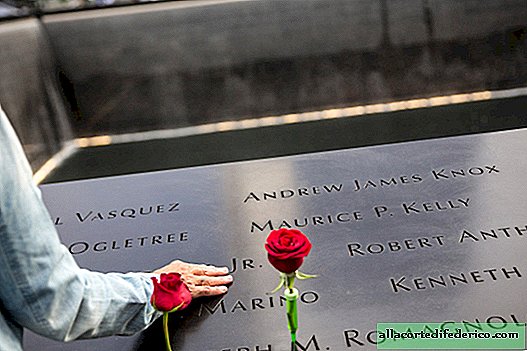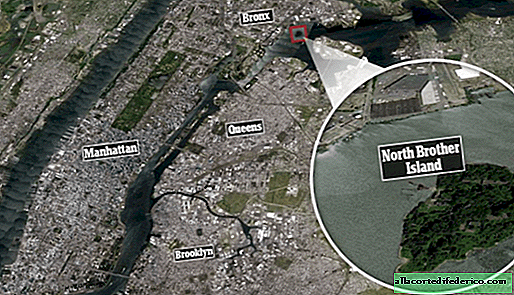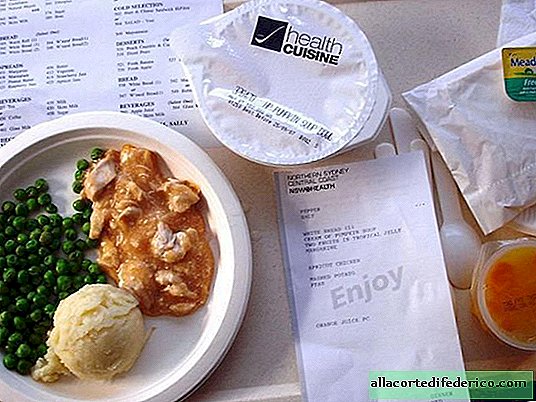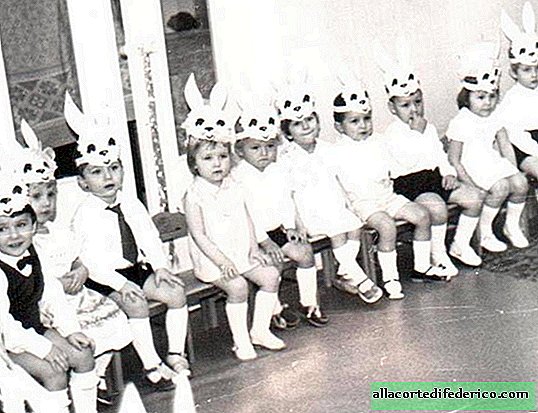One of America's poorest cities
Let's start with the dry facts: 59% of the population of this city officially lives below the poverty line. 93% of residents receive state-owned Medicaid insurance, which is intended for people with low incomes (for comparison, in depressed Newburgh, only 33% of residents receive such insurance). 57% of the inhabitants of this city receive food stamps (non-cash money that can only be spent on food). 99.2% of the city’s population are white, but only about 8% of the city’s inhabitants speak English at home. About half of the inhabitants speak English poorly or do not speak at all. Moreover, there are no slums in the city, no abandoned buildings, no homeless and other problems inherent in poor places. And in fact there is no crime. So what is this place like that?
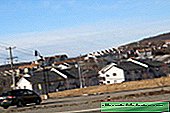
The city is in the state of New York, in Monroe County, just an hour's drive from Manhattan. Many people know this place by the large outlet mall, which is located in neighboring Woodbury. The city is quite young, it was founded in 1977 and is called Kiryas Joel. The name, frankly, is not very characteristic of America. And this is not surprising, because the city was founded and inhabited by Sathmar Hasidim and named after Rabbi Joel Teitelbaum - their religious leader. At his call, the community moved from Brooklyn Williamsburg to New York to stay away from the sins and temptations of the big city. Teitelbaum believed that if the conditions for self-isolation were not created, the Jews would lose their spiritual appearance, their culture and their identity. Self-isolation, therefore, should be the most rigid. Now, surrounded by hills, forests and fences, they are building life in accordance with the laws of the Torah, strictly monitoring compliance with all norms and rules from both local residents and visitors.

In 1977, only 14 Hasidim lived on this territory. Now about 23,000 people live in Kiryas Joel, and the number of its inhabitants continues to grow steadily. According to 2011 data, Kiryas Joel was the poorest city in the United States among communities with over 10,000 inhabitants. I did not find more recent data on this score, but I’m sure that even if the city has fallen in the ranking of America’s poorest cities, it’s not much. At the same time, the community of Satmar Hasidim is the most influential and richest Hasidic community in the world. According to the Washington Post, it controls various companies and real estate, whose value is more than $ 1 billion.
Outwardly, the city is completely different from the place where the poor live: straight rows of neat residential buildings with parked nearby and far from the cheapest cars. New eco-friendly buses run through the streets, and any district center will envy the large administrative buildings.

There is a problem with garbage (there is a lot of it on the streets), but it is in any Hasidim district. Hasidim do not pay any attention to him. In the photo there is a path leading to the lake, where young couples romantically walk on Shabbat. The path lies among trees and piles of garbage.

The average household income in Kiryas Joel is $ 24,430. This is two times lower than the national average ($ 53,657) and 12,000 lower than in the district. There are several reasons for this. Firstly, the size of Hasidic families: on average, it is 6 people (two parents + 4 children). Far from a rarity of a family in which there are 8-10 children. A large number of children make Kiryas Joel the youngest city in America. The average age of its inhabitants is only 12 years. The second reason is the specifics of the social structure of Hasidic families in which the wife has been engaged in home and children for almost all her life, and only the husband earns money. With so many dependents on the shoulders of one working spouse, it is no wonder to fall into the category of poor. Thirdly, the specificity of the Hasidim themselves, who do not disdain to deceive the state in order to obtain social benefits. There are several main fraud schemes:
- They enter into a religious marriage, but do not register their relations at the state level. As a result, a woman becomes a single mother with many children with a bunch of relying benefits.
- They do not pay real estate tax, arguing that they have a synagogue at home (churches and other religious buildings are exempt from tax). To do this, they pray every time in a new house, circling the whole community. As a result, the Okrug’s budget doesn’t receive the money spent on financing schools, repairing roads, running water and sewage systems, firefighters and the police, but most importantly, on social payments that Hasidim are actively receiving.
- They do not show their real incomes, which means they do not pay taxes in full. Most of them work in Hasidic companies, where salaries in envelopes and other schemes of concealment of income are practiced (car registration for a company, etc.). Therefore, according to documents, they can be poverty and starvation, but at the same time live a completely normal life.
- Fraud with insurance, loans and social benefits, issuing payments to non-existent or even dead people.
The state knows about all this and periodically catches especially arrogant members of the community. Unfortunately, the violations are much more widespread, but the authorities do not particularly go into the affairs of the Hasidim, since they have money and political influence. No, they do not have their own politician, but they can give a lot of money to the election fund and, more importantly, they can provide a large number of votes during the elections. They also like to play the topic of anti-Semitism when the blow is directed in their direction. “They want to punish us not because we are doing something wrong,” they say, “but because they do not like Jews!” They solve problems within the community solely with the help of religious courts, which impose penalties for one or another offense. Their opinion on a particular issue often diverges from the state, as it is based on religious laws, and not on US laws. One Hasid was somehow arrested for raping a boy, so the rest came out and demanded that he be released. The journalist asks the protesters: "How so, because he raped your children, and you want to be released?" And those to him: "Yes, he is a bastard, but he is also a Jew, and a Jew should not be in prison. Give us it and we will figure it out."
The city has two bus routes that serve brand new buses. They are financed from the community budget.

Bus stop.

And this is a bus that goes to the Jewish areas of New York. The route is state licensed and subsidized by the state. Inside segregation. Women travel separately from men.

Hasidim have a very low level of education. Only 39% of the population completed all 12 classes and only 5% have higher education. Without exception, all children go to religious schools - yeshivas, where they study the Torah, Yiddish, and a bit of everything else. As a result, a significant part of the community speaks English very poorly. But everyone perfectly speaks Yiddish. The education system, like many other things in the life of Hasidim, is part of a policy of self-isolation. With such a wealth of knowledge, skills, they simply cannot survive in the ordinary world.

Decency is a very important part of Hasidic life. It is expressed in a strict dress code, when everyone goes only in the clothes prescribed by law, covering almost the whole body. Men go all year round in white shirts, black trousers, coats and hats. The uniformity of the men's suit is slightly diluted since Saturday, when they put on large fur hats. Women necessarily wear a wig or shawl that covers their short hair, and cannot wear anything tight, bright or provocative. In the wardrobe there are only calm tones, long skirts and thick grandmother's tights with arrows. Such clothes are designed to get rid of unnecessary thoughts and drives. Bright colors can only be found in children.

The houses of the poor.

Mercedes in the photo is clearly flying. Most likely, it belongs to one of the visiting workers who build, repair and maintain houses. I have never seen a Hasidim in a German car. Mostly they ride Japanese minivans. For this, in New York, the Honda Odyssey is called the Honda Moses.

Street of one of the poorest cities in America. Kiryas Joel is one of the few American cities where there is no television. Hasidim do not watch TV, do not go to the movies and do not read non-religious books. They do not use the Internet either. On a cell phone (approved by the rabbi model) you can only call. You can’t even send SMS.

New homes for the poor. It is impossible to look at all this poverty without tears.

Kosher food delivery.

Hasidim have very strict gender segregation. Women and men have been separated since childhood. This applies to public transport, educational institutions, synagogues and even streets.
A sign prohibiting women from entering the school for boys. So they worry about this, that they even wrote in Russian.

A few years ago a large playground was opened in the city, news of which went around all the local media. The fact is that the city refused the $ 195,000 that the state gave for its construction. An unprecedented act by the Hasidim! And why? Yes, because the site in the city is not simple and was built under the strict supervision of the Decency Committee. There is such an influential body in local government. Children of different sexes play it in different zones and do not intersect with each other. If they took money from the state, they would have to comply with standards where there can be no segregation. And so is the private territory and its own rules. There are four zones on the site: one for boys, the second for girls, the third for boys with dads and the fourth, as you might guess, for girls with moms. That is, they share not only children, but even their parents. What to do to the father in whom some daughters I did not understand.
The zones are not just spaced, but have a color identification: blue for boys and red for girls.

Photo from bholworld.com
At the entrance to the city you will be greeted by a sign informing local regulations. This is another creation of the Decency Committee. The text on it will perplex any unprepared person. Especially those who came from New York, where the main rule is the lack of rules. In the city you can only wear a long skirt or pants. No cuts in the collar area are allowed. Sleeves should cover elbows. It is necessary to communicate exclusively decently and be sure to observe gender segregation in all public places. In the end, they thank you for the respect shown to their values and offer to enjoy the visit.

Most likely, you will not succeed in enjoying the visit. Special if you stopped there on Saturday. Then everyone will look at you as the main enemy of the Jewish people, who desecrate the local streets with their presence. They may even throw something in your direction. Unfortunately, I was lucky to be there for the first time on this very day. Nobody threw anything, but I was completely imbued with the atmosphere of "kindness and friendliness".
If you decide to take a walk with the camera down the city, then you will most likely have problems. I think that you will very quickly get to know the local police called "Public Security". They are not like the police, but actually very much so. Most likely, the first hassid he met will inform about the person with the camera on the walkie-talkie, and soon a machine with a flashing light and a green stripe will appear on the street. Then they will ask you questions and ask for a way out. To phrases such as "Is America here or where?" they will be deaf. They say that you can only shoot with the permission of the rabbi. And there is no permission - come on, bye! A google car filming a streetview could only go a couple of blocks away. Then he was spotted, braked and expelled from the city. I have not photographed much either. I rolled a couple of laps, took a video and clicked out of the car. And frankly, there is nothing to shoot there - the city is extremely dull and monotonous. And Hasidim can be taken in Williamsburg. There they are accustomed and do not rush to people. Moreover, they are all exactly the same, as if they were being produced at the same cloning plant.
Cars "Public Security" Kiryas Joel. Interestingly, according to the laws of the city, local women are forbidden to drive cars.

Another interesting fact: the community of Sathmar Hasidim is extremely negative about the state of Israel, as their leader believed that the creation of a Jewish state before the Messiah came was a serious violation of the Torah. Therefore, they are ardent allies of Palestine.
School buses deliver Hasidic children home after school. There are many children, so buses go in caravans.

Exits from the city are arranged in such a way that you cannot accidentally exit. The fence goes to the very carriageway, and warning signs hang on it.



